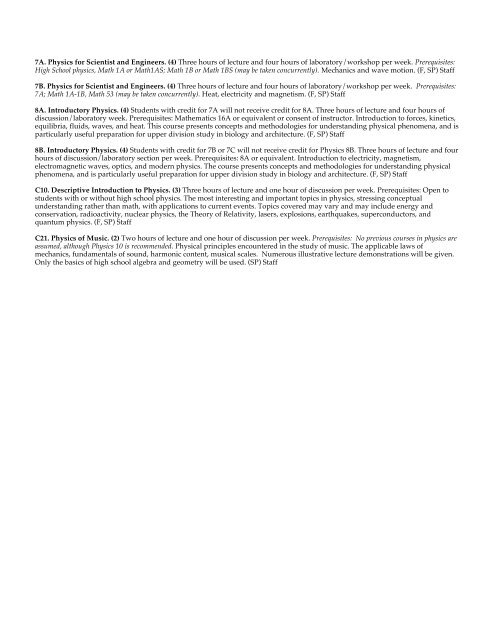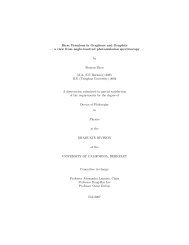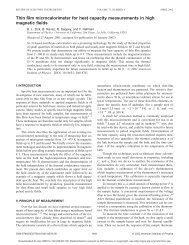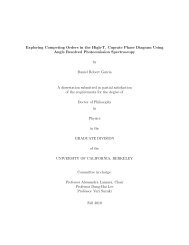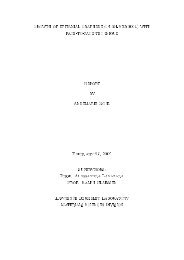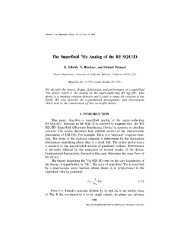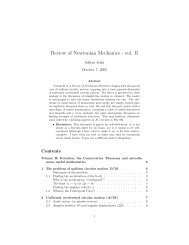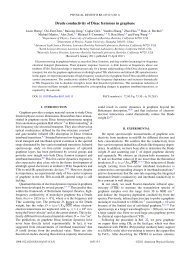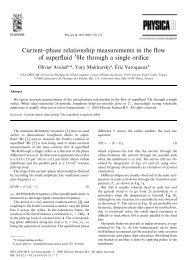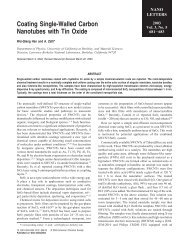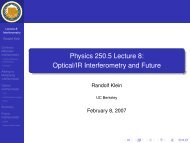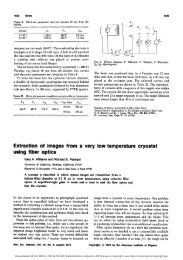Graduate Student Instructor (GSI) Application - Physics
Graduate Student Instructor (GSI) Application - Physics
Graduate Student Instructor (GSI) Application - Physics
Create successful ePaper yourself
Turn your PDF publications into a flip-book with our unique Google optimized e-Paper software.
7A. <strong>Physics</strong> for Scientist and Engineers. (4) Three hours of lecture and four hours of laboratory/workshop per week. Prerequisites:<br />
High School physics, Math 1A or Math1AS; Math 1B or Math 1BS (may be taken concurrently). Mechanics and wave motion. (F, SP) Staff<br />
7B. <strong>Physics</strong> for Scientist and Engineers. (4) Three hours of lecture and four hours of laboratory/workshop per week. Prerequisites:<br />
7A; Math 1A-1B, Math 53 (may be taken concurrently). Heat, electricity and magnetism. (F, SP) Staff<br />
8A. Introductory <strong>Physics</strong>. (4) <strong>Student</strong>s with credit for 7A will not receive credit for 8A. Three hours of lecture and four hours of<br />
discussion/laboratory week. Prerequisites: Mathematics 16A or equivalent or consent of instructor. Introduction to forces, kinetics,<br />
equilibria, fluids, waves, and heat. This course presents concepts and methodologies for understanding physical phenomena, and is<br />
particularly useful preparation for upper division study in biology and architecture. (F, SP) Staff<br />
8B. Introductory <strong>Physics</strong>. (4) <strong>Student</strong>s with credit for 7B or 7C will not receive credit for <strong>Physics</strong> 8B. Three hours of lecture and four<br />
hours of discussion/laboratory section per week. Prerequisites: 8A or equivalent. Introduction to electricity, magnetism,<br />
electromagnetic waves, optics, and modern physics. The course presents concepts and methodologies for understanding physical<br />
phenomena, and is particularly useful preparation for upper division study in biology and architecture. (F, SP) Staff<br />
C10. Descriptive Introduction to <strong>Physics</strong>. (3) Three hours of lecture and one hour of discussion per week. Prerequisites: Open to<br />
students with or without high school physics. The most interesting and important topics in physics, stressing conceptual<br />
understanding rather than math, with applications to current events. Topics covered may vary and may include energy and<br />
conservation, radioactivity, nuclear physics, the Theory of Relativity, lasers, explosions, earthquakes, superconductors, and<br />
quantum physics. (F, SP) Staff<br />
C21. <strong>Physics</strong> of Music. (2) Two hours of lecture and one hour of discussion per week. Prerequisites: No previous courses in physics are<br />
assumed, although <strong>Physics</strong> 10 is recommended. Physical principles encountered in the study of music. The applicable laws of<br />
mechanics, fundamentals of sound, harmonic content, musical scales. Numerous illustrative lecture demonstrations will be given.<br />
Only the basics of high school algebra and geometry will be used. (SP) Staff


